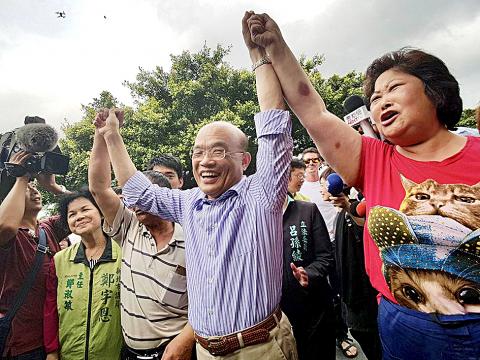New Taipei City’s 4 million residents need a stable power supply to live well, former premier Su Tseng-chang (蘇貞昌) said yesterday, but added that he would not support any power plant that is unsafe or pollutive.
Su on Thursday announced his bid to run for New Taipei City mayor in the Nov. 24 local elections as the Democratic Progressive Party’s (DPP) candidate.
He made the remarks during a visit to the city’s Bali District (八里) after Chinese Nationalist Party (KMT) New Taipei City mayoral candidate Hou Yu-yi (侯友宜) asked him to clarify his stance on the opening of the new Shenao Power Plant in the city’s Rueifang District (瑞芳).

Photo: CNA
Su also said safety should be the primary concern when discussing whether the No. 2 reactor at the Guosheng Nuclear Power Plant in the city’s Wanli District (萬里) should be restarted and when discussing the plant’s decommissioning.
The reactor on March 28 triggered an emergency shutdown due to a problem with its steam valve, one day after it was restarted following the conclusion of an overhaul that had begun in May 2016.
When asked if he had expressed his view to President Tsai Ing-wen (蔡英文), Su did not give a direct response, only saying that he would strive for the well-being of city residents and communicate with the central government over all kinds of issues, including those related to power plants.
Some DPP and KMT lawmakers requested that the central government conduct a new environmental impact assessment for the Shenao plant, but the request was on Friday rejected by Executive Yuan spokesman Hsu Kuo-yung (徐國勇).
Some Rueifang residents have also called for replacing the plant’s coal-fired generators with gas-fired ones.
However, Keelung Mayor Lin Yu-chang (林右昌) of the DPP yesterday said that gas pipelines would have to pass under the city center and provoke more opposition.
The plant’s fate can be decided by New Taipei City Mayor Eric Chu (朱立倫), who could end the controversy if the city government rejected the plant’s opening, Lin said.
The Shenao plant should not have become a tool for political struggle, Lin said, calling on Taiwan Power Co (台電) to communicate with the public by providing scientific data so that members of the public can address the issue in a rational manner.
Meanwhile, Minister Without Portfolio Chang Ching-sen (張景森) on Friday during a radio interview said that the plant must be built to meet northern Taiwan’s electricity demand, adding that the plant would not be needed if the five cities and counties in northern Taiwan could reduce energy usage by 10 percent.
Asked for comment, Taipei Mayor Ko Wen-je (柯文哲) yesterday said the goal would be difficult to achieve.
“Honestly speaking, I think it would be difficult for Taipei to cut electricity usage by even 1 percent, because the industrial and business sectors are developing,” he said. “It is already challenging not to increase electricity usage at all, so it is very difficult to reduce usage by 10 percent.”
Professional assessment is needed to tackle the controversy over whether the plant should be opened, Ko said.
“Many people are doubtful about what the [central] government says, so it should release statistical data to the public... It is obligated to bring out all the information and try to persuade the public,” he said.
Additional reporting by Lee I-chia

‘WIN-WIN’: The Philippines, and central and eastern European countries are important potential drone cooperation partners, Minister of Foreign Affairs Lin Chia-lung said Minister of Foreign Affairs Lin Chia-lung (林佳龍) in an interview published yesterday confirmed that there are joint ventures between Taiwan and Poland in the drone industry. Lin made the remark in an exclusive interview with the Chinese-language Liberty Times (the Taipei Times’ sister paper). The government-backed Taiwan Excellence Drone International Business Opportunities Alliance and the Polish Chamber of Unmanned Systems on Wednesday last week signed a memorandum of understanding in Poland to develop a “non-China” supply chain for drones and work together on key technologies. Asked if Taiwan prioritized Poland among central and eastern European countries in drone collaboration, Lin

The US government has signed defense cooperation agreements with Japan and the Philippines to boost the deterrence capabilities of countries in the first island chain, a report by the National Security Bureau (NSB) showed. The main countries on the first island chain include the two nations and Taiwan. The bureau is to present the report at a meeting of the legislature’s Foreign Affairs and National Defense Committee tomorrow. The US military has deployed Typhon missile systems to Japan’s Yamaguchi Prefecture and Zambales province in the Philippines during their joint military exercises. It has also installed NMESIS anti-ship systems in Japan’s Okinawa

The Chien Feng IV (勁蜂, Mighty Hornet) loitering munition is on track to enter flight tests next month in connection with potential adoption by Taiwanese and US armed forces, a government source said yesterday. The kamikaze drone, which boasts a range of 1,000km, debuted at the Taipei Aerospace and Defense Technology Exhibition in September, the official said on condition of anonymity. The Chungshan Institute of Science and Technology and US-based Kratos Defense jointly developed the platform by leveraging the engine and airframe of the latter’s MQM-178 Firejet target drone, they said. The uncrewed aerial vehicle is designed to utilize an artificial intelligence computer

Renewed border fighting between Thailand and Cambodia showed no signs of abating yesterday, leaving hundreds of thousands of displaced people in both countries living in strained conditions as more flooded into temporary shelters. Reporters on the Thai side of the border heard sounds of outgoing, indirect fire yesterday. About 400,000 people have been evacuated from affected areas in Thailand and about 700 schools closed while fighting was ongoing in four border provinces, said Thai Rear Admiral Surasant Kongsiri, a spokesman for the military. Cambodia evacuated more than 127,000 villagers and closed hundreds of schools, the Thai Ministry of Defense said. Thailand’s military announced that